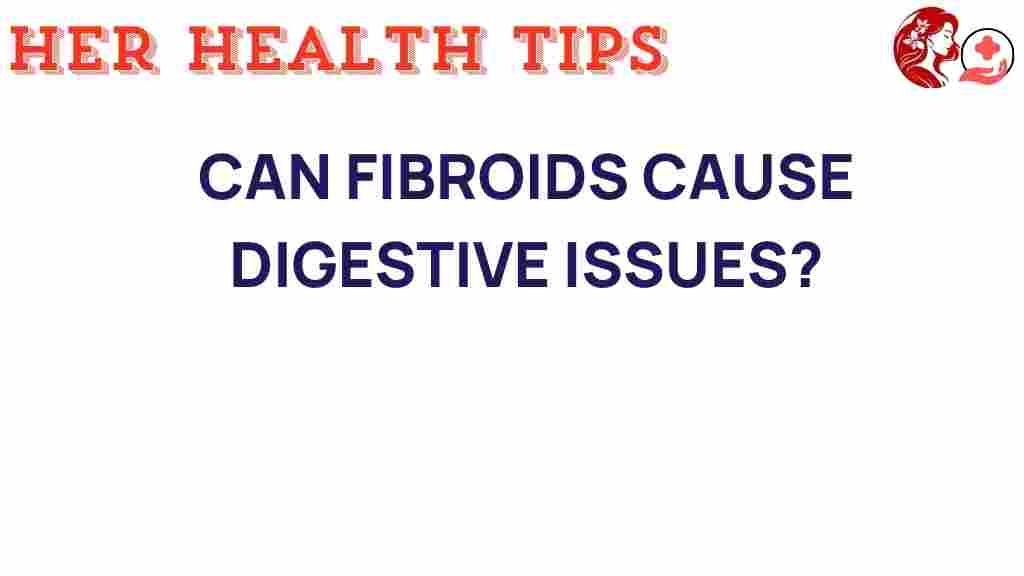Unraveling the Connection: Can Fibroids Cause Digestive Issues?
Fibroids are non-cancerous growths that develop in or on the uterus, affecting many women during their reproductive years. While they are primarily associated with reproductive health, many women wonder about their potential impact on other areas of health, specifically digestive issues. This article will explore the connection between fibroids and digestive issues, shedding light on symptoms, diagnosis, treatment, and overall wellness in the context of women’s health.
Understanding Fibroids
Fibroids, also known as uterine leiomyomas, can vary in size and number. Some women may have multiple small fibroids, while others may have a single large one. They can grow within the uterine wall, on the surface of the uterus, or even inside the uterine cavity. The exact cause of fibroids is unknown, but they are influenced by hormonal factors, particularly estrogen.
Symptoms of Fibroids
Many women with fibroids experience a range of symptoms, although some may have no noticeable signs at all. Common symptoms include:
- Heavy menstrual bleeding
- Pelvic pain or pressure
- Frequent urination
- Constipation
- Back pain
- Enlarged abdomen
Among these, digestive issues such as constipation and abdominal discomfort can be particularly concerning. This raises the question: can fibroids directly cause digestive problems?
How Fibroids May Affect Digestive Health
The connection between fibroids and digestive issues primarily stems from the location and size of the fibroids. Here are several ways in which fibroids can impact digestive health:
- Pressure on the Intestines: Larger fibroids can exert pressure on the intestines, leading to constipation and discomfort.
- Altered Hormonal Levels: Fibroids can influence hormones that, in turn, can affect digestion.
- Inflammation: Fibroids can cause localized inflammation, which may disrupt normal digestive function.
Understanding these connections is crucial for managing symptoms effectively.
Diagnosis of Fibroids
If you suspect that fibroids may be causing digestive issues, it is essential to seek a proper diagnosis. Here are the steps typically involved in diagnosing fibroids:
- Medical History: Your healthcare provider will take a detailed medical history, including symptoms and menstrual cycle patterns.
- Physical Examination: A pelvic exam may be conducted to check for any abnormalities in the uterus.
- Imaging Tests: Ultrasound, MRI, or CT scans can help visualize fibroids and assess their size and location.
Accurate diagnosis is key to developing an effective treatment plan and addressing any related digestive issues.
Treatment Options for Fibroids
Treatment for fibroids varies depending on the severity of symptoms, the size and location of the fibroids, and a woman’s overall health. Options include:
- Watchful Waiting: If fibroids are small and asymptomatic, doctors may recommend monitoring them without immediate treatment.
- Medications: Hormonal treatments can help manage symptoms, while nonsteroidal anti-inflammatory drugs (NSAIDs) may relieve pain.
- Minimally Invasive Procedures: Options like uterine artery embolization (UAE) can reduce blood flow to fibroids, causing them to shrink.
- Surgery: In severe cases, a hysterectomy (removal of the uterus) or myomectomy (removal of fibroids) may be necessary.
Each treatment option has its advantages and drawbacks, and the choice largely depends on individual circumstances.
Managing Digestive Issues Related to Fibroids
In addition to treating fibroids, managing digestive issues is crucial for overall wellness. Here are some tips to help alleviate symptoms:
- Dietary Changes: Increasing fiber intake through fruits, vegetables, and whole grains can help manage constipation.
- Hydration: Drinking plenty of water supports digestive health and can ease constipation.
- Regular Exercise: Physical activity can enhance bowel function and decrease pelvic pressure.
- Stress Management: Techniques like yoga and meditation can help reduce stress, which may improve digestive health.
For more detailed guidance on wellness and women’s health, consider visiting this resource.
When to Seek Help
If you experience persistent digestive issues along with other symptoms, it is important to consult a healthcare professional. Signs that indicate the need for medical attention include:
- Severe abdominal pain
- Changes in bowel habits that last longer than a few weeks
- Unexplained weight loss
- Blood in stools
These symptoms may not only indicate fibroids but could also signal other underlying health issues requiring prompt attention.
Conclusion
In summary, while fibroids are primarily associated with reproductive health, they can also contribute to digestive issues in some women. Understanding the symptoms, diagnosis, and treatment options is essential for managing both fibroids and related digestive problems effectively. Maintaining good uterine and digestive health is vital for overall wellness. If you suspect that fibroids are affecting your health, consult with a healthcare professional to explore your options and pave the way for a healthier future.
By staying informed and proactive about your health, you can navigate the complexities of fibroids and their potential impact on your digestive system, ensuring that you lead a fulfilling and healthy life.
This article is in the category Conditions and created by HerHealthTips Team
